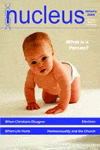In a society driven by consumerism and technology, our knowledge and capabilities continue to advance at a frightening rate. At the same time, a postmodern culture with no moral absolutes leaves individuals ill-equipped to address the tricky issues such developments bring. As Christians, this presents us with a tremendous opportunity: to be light in the darkness, offering God's perspective on the problem. However, to communicate this effectively, it is vital that we not only have a grasp of the current social climate but also a solid biblical foundation from which to start.
Dr David Cook is Professor of the Integration of Faith and Learning at Wheaton College, USA. He has, in his own words, been bringing 'God's view' to the public for many years, most notably as a former participant on the BBC Radio 4 programme The Moral Maze and as the former head of UCCF's Whitefield Institute in Oxford. Cook starts from the viewpoint that God's standards for living are revealed in both the Bible and the life of Jesus. Question Time was written with the dual purpose of encouraging Christians to think more biblically but also demonstrating to non-believers how Christians think. His aim is not to provide comprehensive answers but to ensure that, whatever the question, his readers will be able to start from first principles and arrive at a genuinely Christian response.
Question Time addresses a cross-section of issues facing contemporary Western society, including fashion, violence, sexuality and the media. Each topic forms a chapter and is addressed from several different angles in which Cook attempts to answer a specific question. His responses take the same format each time, starting with a brief exploration of the background to the problem. He then provides an outline of society's response, followed by a Christian perspective on the issues.
It's clear that Cook has his finger firmly on Britain's cultural pulse. He identifies the principal issues at stake and is also able to summarise succinctly the attitudes and opinions of secular society. His Christian perspectives are down to earth but thoroughly biblically based. He rarely provides a definitive answer - more often than not, there simply isn't one - but succeeds in sensitively outlining differing viewpoints that exist within the church.
There are plenty of Christian books available that cover many of the issues more comprehensively and come closer to satisfying the reader searching for answers. However, Question Time does succeed in providing both a valuable outline of the issues facing society today, as well as a useful introduction to contemporary Christian thought.
Reviewed by:
Helen Barratt
Nucleus editor































